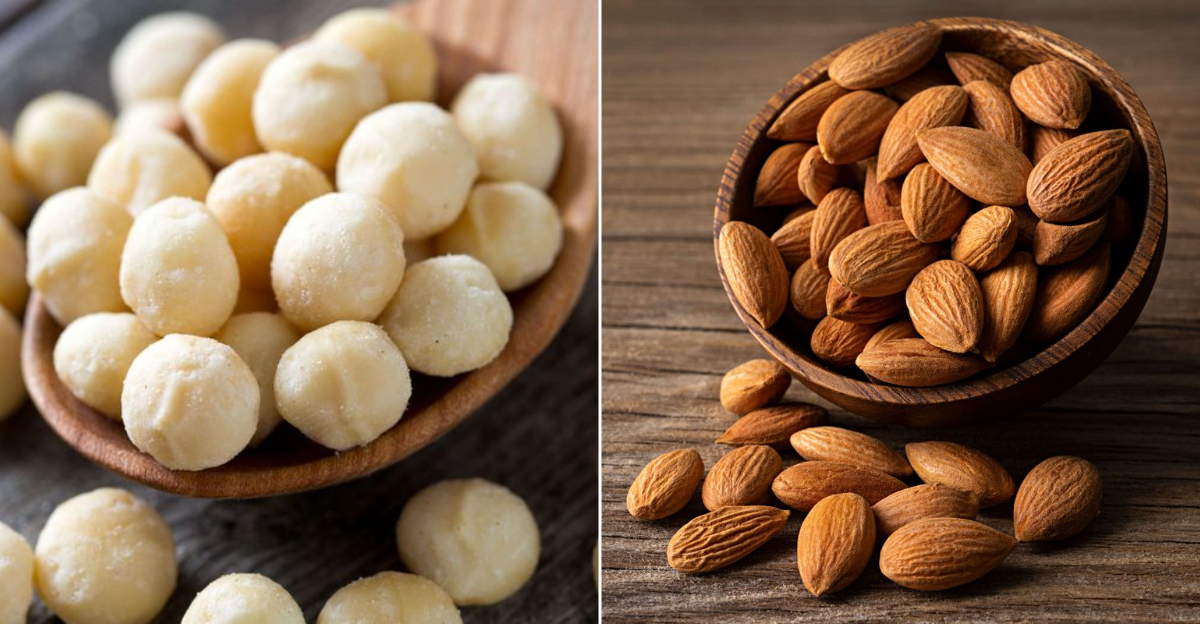The Healthiest Types Of Nuts (Ranked From Worst To Best)

Nuts are nature’s nutritional powerhouses, packed with healthy fats, protein, and essential nutrients. They make perfect snacks and add crunch to many dishes while delivering serious health benefits.
Whether you’re looking to boost heart health or simply find a satisfying snack, knowing which nuts offer the most nutritional bang for your buck can help you make smarter choices.
1. Macadamia Nuts: Buttery Indulgence
Creamy, buttery macadamias might taste like dessert, but they’re actually nutritional treasures. They contain the highest amount of monounsaturated fats among all nuts, which helps lower bad cholesterol levels.
The downside? They’re calorie champions at 204 calories per ounce and offer less protein than other nuts. Their hefty price tag also makes them more of an occasional luxury than a daily staple.
2. Brazil Nuts: Selenium Superstars
Just one Brazil nut exceeds your daily selenium needs! These Amazonian giants pack a mineral punch that supports thyroid function and boosts your immune system in a single bite.
Size matters with these nuts as they’re among the largest in the world. Moderation is key, though, as too much selenium can be harmful.
Stick to 1-2 daily to avoid overdoing it while still reaping their impressive antioxidant benefits.
3. Pecans: Southern Belle of Nuts
Southern charm meets nutritional prowess in these buttery, ribbed delights. Pecans boast the highest antioxidant content of any nut, helping fight inflammation and cellular damage.
Their rich flavor makes them pie favorites, but they’re healthiest enjoyed raw. Watch the portion size as these nutrient-dense treats pack 196 calories per ounce with less protein than their nutty cousins higher up our ranking.
4. Hazelnuts: The Chocolate’s Best Friend
Famous for their romance with chocolate, hazelnuts deserve recognition in their own right. These woodland gems deliver impressive vitamin E levels—about 21% of your daily needs per ounce—protecting cells from oxidative damage.
Their distinctive flavor profile comes with heart-healthy benefits too. Studies show hazelnuts may help reduce LDL cholesterol and inflammation markers.
The only reason they don’t rank higher? They contain slightly less fiber and protein than our top contenders.
5. Cashews: The Curved Crowd-Pleaser
Fun fact: cashews aren’t truly nuts but seeds hanging from the bottom of cashew apples! Their distinctive curve delivers more than just good looks: they’re packed with magnesium, copper, and zinc.
Lower in fat than most nuts, cashews still satisfy with their creamy texture. They shine in plant-based cooking, creating luxurious dairy-free sauces and cheeses.
Their versatility and moderate calorie count (157 per ounce) make them a smart pantry staple.
6. Pistachios: The Green Protein Machine
Mother Nature’s finger food comes with built-in portion control! The act of shelling pistachios slows down snacking, helping you eat more mindfully. Their vibrant green hue signals their lutein and zeaxanthin content: antioxidants that benefit eye health.
Pistachios win the protein contest among nuts with 6 grams per ounce. They’re also fiber champions, promoting gut health and keeping hunger at bay longer than many other nuts. Just watch out for added salt in commercial varieties.
7. Walnuts: Brain-Shaped Brain Food
Mother Nature has a sense of humor as walnuts resemble mini brains and actually benefit brain health! They’re the only nut significantly high in plant-based omega-3 fatty acids, making them inflammation-fighting superstars.
Research suggests regular walnut consumption may improve cognitive function and reduce dementia risk. Their slightly bitter skin contains beneficial phenols with antioxidant properties.
At 185 calories per ounce, they deliver impressive nutritional density with heart and brain benefits.
8. Almonds: The Nutritional All-Star
Crowned nutrition royalty for good reason, almonds deliver the most well-rounded package of all nuts. Their impressive protein content (6g per ounce) keeps hunger at bay while their fiber promotes gut health and steady blood sugar.
Almond skins contain beneficial flavonoids that work synergistically with vitamin E to double antioxidant punch. Research consistently links almond consumption with lower heart disease risk.
Their versatility is unmatched—from milk alternatives to flour, almonds transform into countless healthy options.
